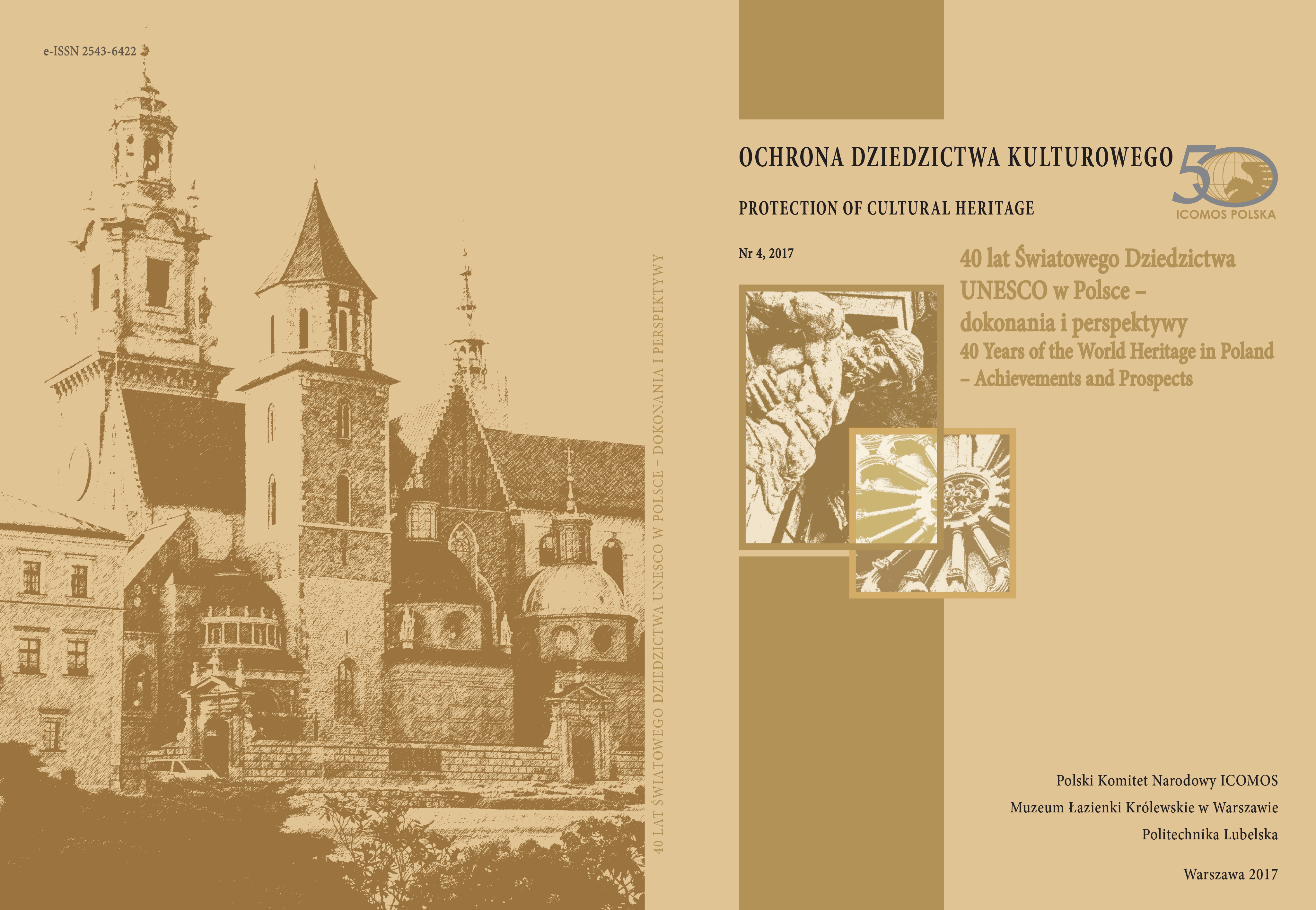Poland’s participation in initial efforts to implement resolutions of the Convention
Article Sidebar
Issue No. 4 (2017)
-
Civic Committee for the Restoration of Cracow Heritage: origin, experience, programme
Bogusław Krasnowolski7-14
-
Historic monument – the Gniezno Cathedral – the dominant monument of the city landscape now and in the past
Magdalena Meller, Karolina Kowalska15-20
-
Cultural landscape on the World Heritage List - Polish experiences
Andrzej Michałowski21-30
-
Adaptation of buildings of historical significance in Gdańsk. The key issues of Regional Heritage Protection Officers’ perspective
Karolina Szczepanowska31-46
-
Prospects for inscribing certain elements of the cultural landscape of Szczecin as a Polish listed monument
Zbigniew Władysław Paszkowski, Jakub Ignacy Gołębiewski, Izabela Kozłowska47-62
-
Gdańsk on the UNESCO World Heritage List - 20 years of attempts and missed opportunities
Marcin Gawlicki63-72
-
Consequences of entering assets into the UNESCO List – prestige and what next?
Ewelina Kowalska73-81
-
Churches of Peace in Jawor and Świdnica – conservation work of the interior and furnishings, as an example of protecting buildings inscribed on the World Heritage List
Małgorzata Korpała83-92
-
The authenticity of painted decorations of the Old Town in Warsaw
Anna Jagiellak93-103
-
Management Plans for the Churches of Peace in Jawor and Swidnica as an Example of Management Problems with UNESCO World Heritage Site
Waldemar J. Affelt105-120
-
Ideas and assumptions of The Convention concerning the Protection of World Cultural and Natural Heritage and their implementation in Poland from the perspective of the Polish UNESCO Committee
Sławomir Ratajski121-126
-
Poland’s participation in initial efforts to implement resolutions of the Convention
Krzysztof K. Pawłowski127-134
-
The perspectives of protection of the world heritage in Poland – the tentative list and proposals of nominations to the world heritage list
Jakub Lewicki129-142
-
Places of memory under UNESCO 1972 World Heritage Convention and criterion VI of the Op erational Guidelines of its implementation
Wojciech Kowalski149-162
-
The role of the “League of Polish Cities and UNESCO Sites” in the preservation of Cultural Heritage
Zbigniew Fiderewicz163-165
Main Article Content
DOI
Authors
Abstract
In the period between ratification of the Convention and its coming into effect in 1977, Poland became an important centre for shaping the global identification and cultural heritage preservation system. The 1976 Warsaw Governmental Experts Conference concerning protection and role of historic and traditional complexes allowed for adopting a definition thereof. “A meeting of experts on the improvement and harmonization of systems on the inventories and catalogues of monuments” which took place in Warsaw in 1977, was the next stage.
Polish delegate, who had been chosen a vice-president of the Committee during the first session thereof in 1977, submitted a set of comments on operational directives on the criteria for historical value, authenticity, urban complexes, and technological artefacts. Polish nominations provided illustration of this intricate matter. These included: urban complex of Cracow, Wieliczka Salt Mine, Warsaw Old Town (rebuilt after WW2), and the former Concentration Camp
Auschwitz-Birkenau. Polish ICOMOS presented the “Protection and Management in Cities of Exceptional Monumental Value” programme in 1995, which was subsequently accepted by UNESCO.
Keywords:
Article Details
Abstract views: 302
Krzysztof K. Pawłowski, Lodz University of Technology
W 1958 ukończył studia na Wydziale Architektury Politechniki Warszawskiej. W 1965 doktoryzował się, osiem lat później uzyskał stopień doktora habilitowanego. W 1982 otrzymał tytuł naukowy profesora. Specjalizuje się w zagadnieniach z zakresu historii urbanistyki i rewaloryzacji miejskich zespołów zabytkowych.
Pracował Zakładzie Teorii i Historii Architektury i Urbanistyki Polskiej Akademii Nauk, w Instytucie Historii Kultury Materialnej PAN oraz w Instytucie Planowania Przestrzennego macierzystej uczelni. W 2000 został profesorem zwyczajnym na Wydziale Budownictwa, Architektury i Inżynierii Środowiska Politechniki Łódzkiej. Był również dyrektorem Instytutu Architektury i Urbanistyki na tej uczelni. Pełnił funkcje doradcy premiera Jerzego Buzka ds. dziedzictwa narodowego (1999–2001), generalnego konserwatora zabytków (1999), a także prezesa polskiego komitetu ICOMOS (1993–2003). Jako ekspert współpracował z UNESCO w zakresie ochrony dziedzictwa narodowego w krajach europejskich, afrykańskich i azjatyckich. Wszedł w skład prezydium Komitetu Architektury i Urbanistyki PAN.






